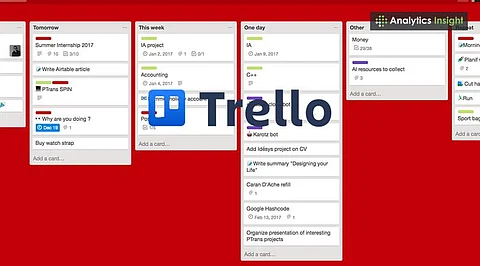

Trello is a visual task management tool designed to simplify personal and team workflows.
Users can quickly get started with an easy Trello login and flexible board layouts.
Trello’s drag-and-drop system and integrations make it one of the most intuitive project management tools.
Managing assignments and projects doesn't have to be too difficult. Trello is now the preferred way for many people, groups, and even startups to arrange their work without the need for convoluted procedures. However, what exactly is Trello, and what makes it so well-liked?
Fundamentally, Trello is a free online project management application that enables users to arrange work visually with the use of boards, lists, and cards. Imagine it as a digital whiteboard, designed for collaboration, real-time updates, and compatible with any device.
Trello, which has more than 50 million users globally, is renowned for being user-friendly yet robust enough to handle anything from team-wide product launches to to-do lists. Its foundation is the Kanban methodology, which divides work into phases so that tasks progress through well-defined stages - from conception to completion.
To get started, you don't have to be tech-savvy. Many users find the Trello login and first board setup to be so easy that they continue using it over time.
Here's how to get started if you're new to Trello:
Sign up with your Microsoft, Google, or email address at Trello.com. After completing the Trello login procedure, which takes less than a minute, you will be sent straight to your workspace.
Your projects are housed on boards. Give your board a name, such as 'Marketing Plan' or 'Home Renovation,' and begin adding lists for each stage, such as 'To Do,' 'In Progress,' and 'Done.'
Each card represents a distinct duty. Include due dates, labels, attachments, or even checklists on a card for every action item. Drag-and-drop is easy.
Also Read: Transforming Enterprise Data Management with Centralized Masterdata Tools
Trello was designed with teams in mind, not just individuals. Trello for Teams enables multiple users to tag peers, interact in real-time, and link additional applications such as Zoom, Slack, and Google Drive.
Because Trello is transparent, everyone can see what is being worked on, what will happen next, and who is in charge of what. Teams at organizations like Google, Coinbase, and Kickstarter use it because of this.
Butler Automation: To automate repeated tasks, set up rules and actions (e.g., relocating a card when tagged complete).
Power-Ups: Enhance your boards with timelines, calendar views, and integrations.
Mobile Access: Trello's iOS and Android apps make it simple to update tasks while on the go.
Trello board can be customized to meet your needs as a team, student, or freelancer:
Organize blogs, social media postings, and publication schedules with the Content Calendar.
CRM Board: Visually track leads, calls, and customer information.
Create a study planner to organize your week, keep track of your homework, and prepare for tests.
One of the main reasons users continue to use Trello is its complete customization capabilities.
Also Read: Top 10 Content Management Tools to Boost Your Productivity
So, what exactly is Trello? It's a clever, easy method of maintaining organization and advancing tasks. Without the learning curve of more complicated project tools, users may create anything with just a Trello login, from simple task lists to intricate team dashboards.
Trello is a visual collaboration tool that helps teams organize tasks and streamline workflows using customizable boards. Among popular project management tools, Trello stands out for its simplicity and flexibility in managing both personal and professional projects.
